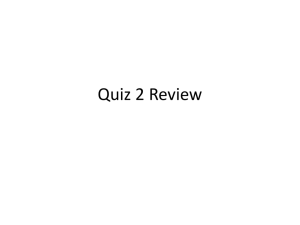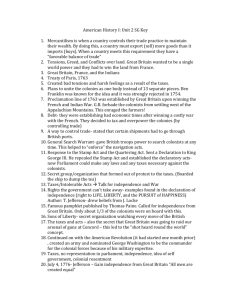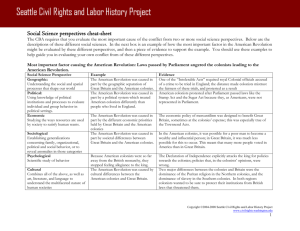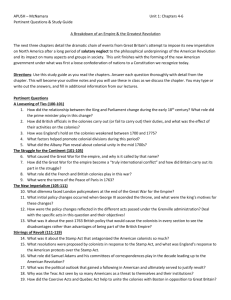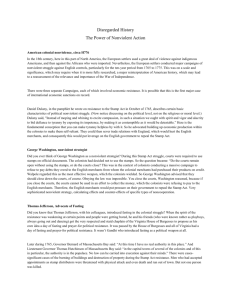Unit 2 Key Terms
advertisement
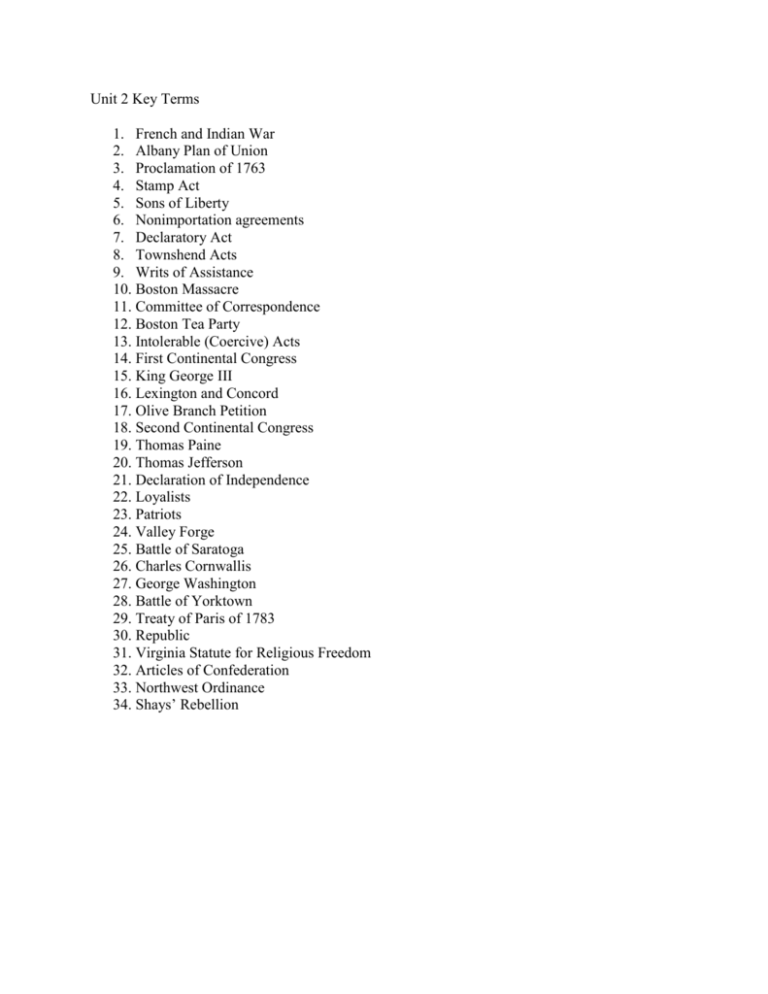
Unit 2 Key Terms 1. French and Indian War 2. Albany Plan of Union 3. Proclamation of 1763 4. Stamp Act 5. Sons of Liberty 6. Nonimportation agreements 7. Declaratory Act 8. Townshend Acts 9. Writs of Assistance 10. Boston Massacre 11. Committee of Correspondence 12. Boston Tea Party 13. Intolerable (Coercive) Acts 14. First Continental Congress 15. King George III 16. Lexington and Concord 17. Olive Branch Petition 18. Second Continental Congress 19. Thomas Paine 20. Thomas Jefferson 21. Declaration of Independence 22. Loyalists 23. Patriots 24. Valley Forge 25. Battle of Saratoga 26. Charles Cornwallis 27. George Washington 28. Battle of Yorktown 29. Treaty of Paris of 1783 30. Republic 31. Virginia Statute for Religious Freedom 32. Articles of Confederation 33. Northwest Ordinance 34. Shays’ Rebellion 1. Location where the Continental Army, under Washington, endured a harsh winter but famously emerged stronger and more disciplined 2. This describes general warrants to search colonists’ property for smuggled goods 3. In this event, British soldiers killed five colonists in Massachusetts as a result of tension created by the Townshend Acts 4. Though it failed, this represented the first time the colonies considered joining together for common defense 5. Major leader of the British forces during the American Revolution who famously surrendered at the Battle of Yorktown 6. This direct tax on the colonists taxed most printed materials and led to numerous protests in the colonies 7. This group formed to protest the Stamp Act, organizing protests and harassing tax collectors 8. Leader of England during the American Revolution 9. The first armed conflict between colonial and British forces, considered the “shot heard around the world” 10. First written plan of government for the United States which was weak and replaced 11. Meeting in which delegates from the colonies met and asked King George III to restore colonial rights and spoke against the Intolerable Acts 12. Wrote “Common Sense,” a pamphlet that argued for independence from Britain 13. Last major battle of the American Revolution and victory for America 14. A type of group formed in the colonies to communicate with other colonies about British activities 15. Plan for settling territory in the United States that included a prohibition of slavery 16. This colonial protest to the Tea Act led to Britain passing the Intolerable Acts 17. This series of laws from Britain responded to the Boston Tea Party, including laws that shut down the Boston port, expanding the Quartering Act, and further limiting the colonists’ rights 18. This conflict resulted in France losing its territory in America and led England to consider new ways to pay for their colonies in America 19. Ended the American Revolution with England recognizing the United States as a new nation 20. Last effort of the Second Continental Congress to reconcile with King George III, which he rejected 21. Author of the Declaration of Independence 22. Major turning point in the American Revolution that convinced France to help America 23. This series of acts taxed items like tea, paper, and glass 24. This document asserted that Britain had violated the natural rights of the colonists and concluded that the British government no longer had authority over the colonists 25. Colonists who sided with the British during the American Revolution 26. Signed by colonists, this led to a boycott of British goods in protest of the Stamp Act 27. To save face after repealing the Stamp Act, this law asserted England’s authority to make laws for the colonies 28. Action by Massachusetts farmers in response to what they saw as unfair taxes, exposed weakness in Articles of Confederation 29. This order from King George III told the colonists not to settle past the Appalachian Mountains 30. First law that separated church and government institutions 31. Colonists who were opposed to the British during the American Revolution 32. Major leader of American forces during the American revolution who famously won at the Battle of Yorktown 33. Meeting which delegates from the colonies created the Continental Army and declared independence from Britain 34. Form of government in which power resides with a body of citizens entitled to vote for elected officials who represent the voters and who must government according to laws and a constitution
